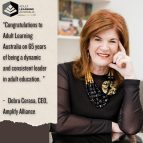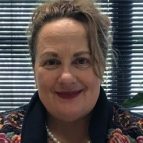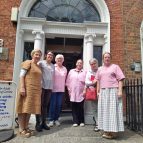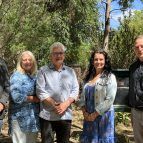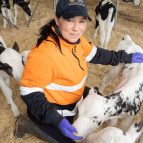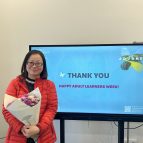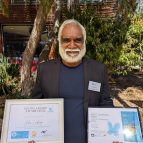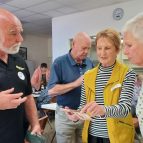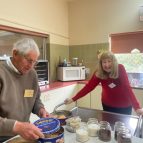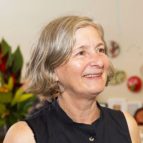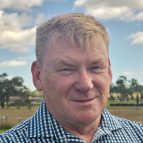Green skills for sustainable living
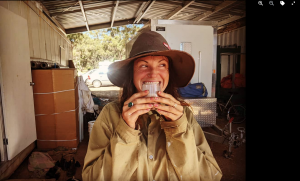 A Castlemaine course is helping people take steps that are good for their pockets and good for the planet.
A Castlemaine course is helping people take steps that are good for their pockets and good for the planet.
On Thursday mornings Mel Willard (pictured) swaps her farm gear of grubby t-shirt and shorts for deodorant and clean clothes and heads off to teach ‘Saving money, energy and the environment’ at Castlemaine Community House. The eight week course aims to demystify jargon and teach people simple steps to taking a more active role in sustainable use of resources and care for the environment.
Mel is co-owner of a local organic market garden and orchard Gung Hoe Growers and has first-hand experience of how small actions can have big impacts.
‘I’m so lucky to be able to teach people about what I believe in. And it’s such a contrast to the day-to-day physical labour of planting and working on the land.’
The new course appeals to locals keen to learn more about environmental sustainability and positive and practical changes they can make.
‘I really love working with people who are excited to learn about something I’m passionate about.’ Mel Willard, tutor.
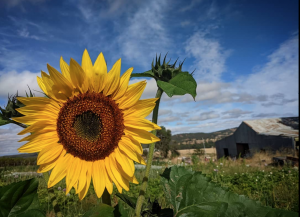 Putting sustainability into practise
Putting sustainability into practise
Six months ago Lorella Burns decided she was tired of frequent visits to the supermarket.
‘I thought why am I doing this? When I was a kid we hardly ever went to the supermarket. Our family grew all our own veggies and ate our own meat.’
When she saw the course advertised it struck a chord. But she was nervous about the prospect too.
‘I was moving out of my comfort zone. I have dyslexia and I’ve become really good at hiding it. Every time I try something new there’s a nervousness about doing something beyond what I’m used to doing at work and at home’.
She found a welcoming atmosphere and an approachable and enthusiastic teacher who brought the diverse group together.
‘We bounce ideas off one another during class and really learn a lot from one another. We all get on so well, it’s really lovely.’
‘Mel is absolutely fantastic. The content of the course can be challenging but Mel does a great job explaining it. She gets us doing group activities and uses diagrams and things to put information in perspective. She encourages us to think about how things work in our own homes.
‘I’ve got a more positive attitude towards sustainability now. I learned that making changes is not as hard as you think. It’s not a matter of changing the world but of starting with what you can.
‘Before I did the course I thought that sourcing local fruit and veggies would be really difficult but now I’m much more aware of how much local produce is actually available and how easy it is to buy.
‘I’m more conscious of power saving. Since I started the course we’ve installed solar panels so I do things like baking during the daytime to make the most of our solar power.
‘I also do a lot more meal planning than I used to. I’d fallen into the habit of using tins and jars and packaged foods but now I do a lot more cooking from scratch. And I get the kids to cook with me because it’s so important for them to learn how to do it too’.
Lorella’s discovered that she loves learning. ‘I’m really enthusiastic now about doing more. At the moment I’m doing a youth mental health first aid course so I’m pushing myself because I know I’m capable, I just needed that bit of confidence.’
Green knowledge is powerful
Mel says teaching people about the bigger picture of energy, water and food systems and presenting information in an accessible and non-judgmental way is a crucial first step in helping them make changes.
‘A course like this is exciting because once people understand they can act differently, it’s really empowering.
‘We immediately have this expectation of services and resources like running water, electricity and food at our fingertips. But once people become aware of how those systems influence each other it has a huge impact. They can see that we can be active participants instead of going along with what the world throws at us.’
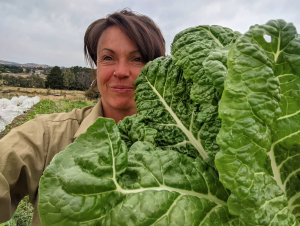
Mel says setting achievable goals is important. ‘It’s easy to feel overwhelmed when you read about climate change. It can feel huge. What I’ve learned from working on community projects in our area is that there’s a need to balance the grim stats and the hard reality with good examples internationally and locally to inspire people. So this course is about what you can do in your own context to make improvements in your own life and in your particular circumstances. It’s very very exciting.’
Mel has already seen big changes in the class. ‘One of the students was horrified when she learned about the environmental costs associated with her food. So she signed up for a Community Supported Agriculture program that connected her with local farmers. Now she’s supporting a farmer by buying food boxes of seasonal, local and organic produce.
The people in the class are very engaged and they want to do as much as they can. That’s why it’s such a great course.
‘And it has a ripple effect. We all take what we’re learning home and talk about it to those close to us so it makes an impact beyond the classroom.’
‘Working with people who want to learn is a joy. They are so engaged, excited and enthusiastic and we are learning together.’ Mel Willard, tutor
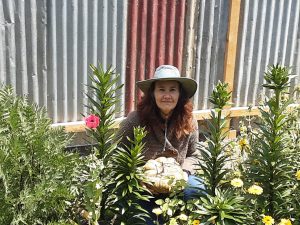
Rosie gets the learning bug
Rosie Sandvik signed up for ‘Saving money, energy and the environment’ because it was something she was interested in as well as being a chance to meet like-minded people.
Fifty six year old Rosie has retired from a career in disability services and lives in Guildford, a small town 13 kilometres from Castlemaine. She had had solar panels and water tanks installed on her property and was interested in learning more about how she could make a difference.
‘I was excited but I haven’t done adult education for a few years so I was a bit nervous that everyone would be using tablets and computers and I would be the only one using pen and paper. But it was a really positive experience from the start.
‘The course is really interesting and practical. Before I didn’t know anything much about energy apart from how to turn on a switch. Now I know a lot more about energy markets and companies that operate as middlemen.
‘The other thing it taught me is how finite water is as a resource. Now I’m going to get the water tank plumbed so we can use tank water in the laundry and bathroom instead of town water.’
Rosie already had a veggie garden but she’s started seed saving now. And she is much more aware of food miles — the energy, water and transport impacts involved in food production — and is more likely to buy local food than she was before.
Best of all the course was not intimidating. ‘It’s not a scientific course, it’s hands on and covers basic principles about energy, water, recycling, and food production. It’s good for anyone interested in the environment and saving a bit of money along the way.
‘After this I’d like to learn more. I’m really interested in recycling which has been a bit of a disaster so it would be great to get some ideas on what to do to help change that.’
Sustainability education opens opportunities
Castlemaine Community House Community Development and Learn Local Coordinator Kerrily Jennings says that the course also opens up education and job opportunities.
‘We have so many amazing new businesses opening up here that have environmental concerns underpinning them. So there’s a lot of job opportunities in this area for people who have an interest in that but who are not sure how to get a foot in the door or don’t have the literacy and numeracy skills required. It’s a good course for providing people with the skills and confidence for that sort of work.
‘We also see it as a taster or feeder for other courses too. So it’s a chance for people who aren’t quite ready for a bigger study commitment to dip their toe in the water.’
The pre-accredited program was developed as a pilot by Jesuit Social Services as part of its Ecological Justice Hub and funded through the ACFE Board Capacity and Innovation Fund, which enables Victorian Learn Local providers to develop and implement new initiatives.
See the full issue of Quest 4, 2021

